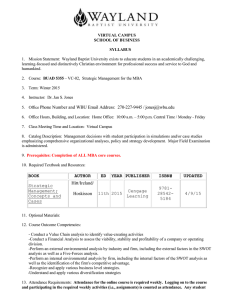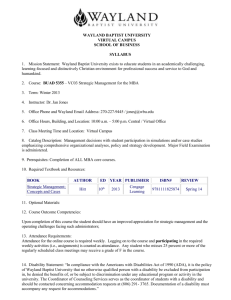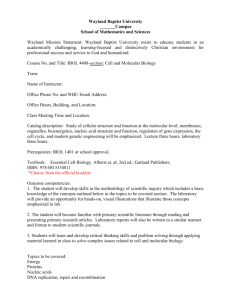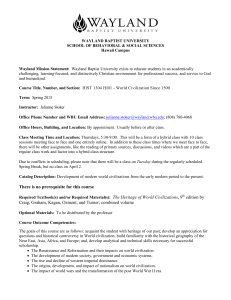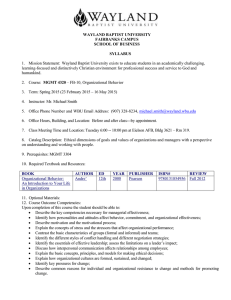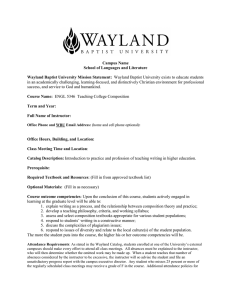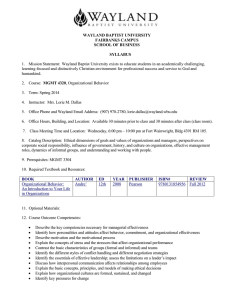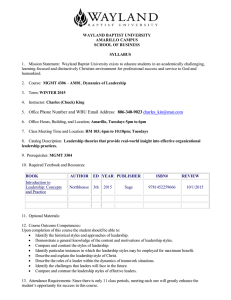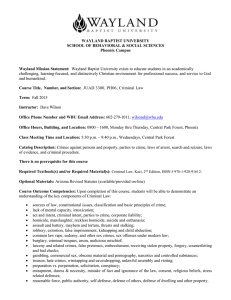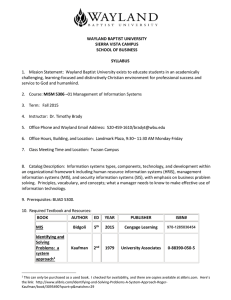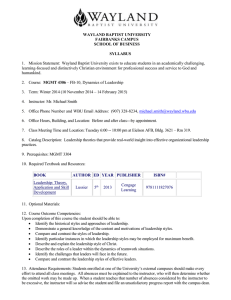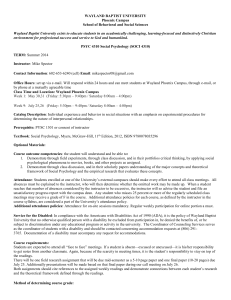Document 10405233
advertisement
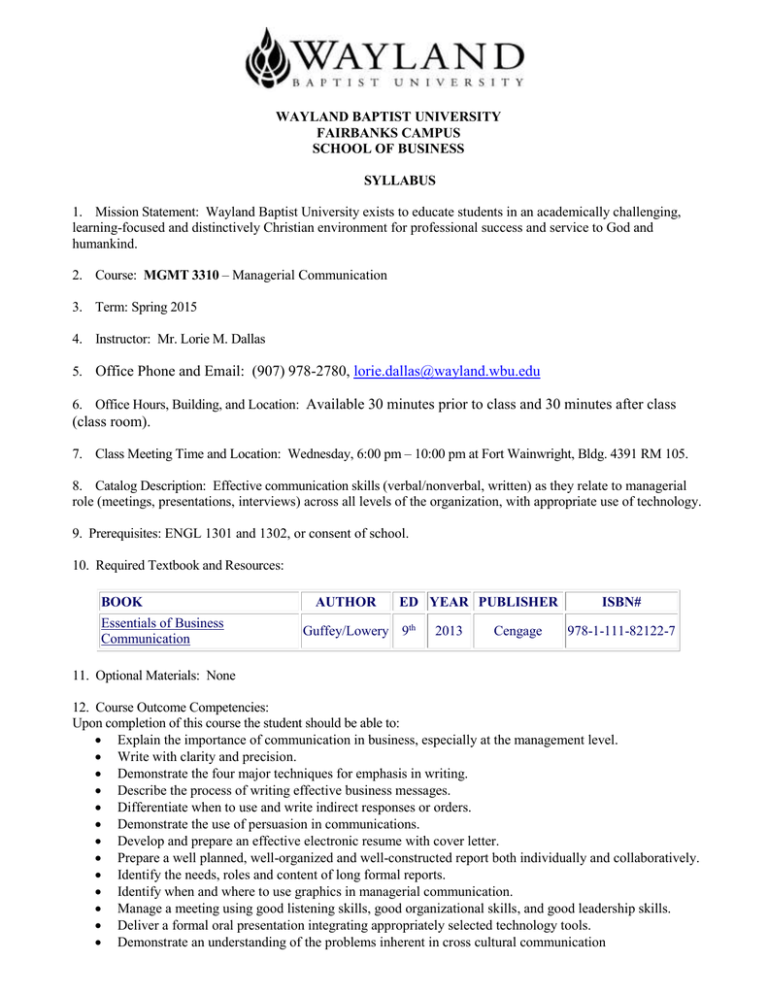
WAYLAND BAPTIST UNIVERSITY FAIRBANKS CAMPUS SCHOOL OF BUSINESS SYLLABUS 1. Mission Statement: Wayland Baptist University exists to educate students in an academically challenging, learning-focused and distinctively Christian environment for professional success and service to God and humankind. 2. Course: MGMT 3310 – Managerial Communication 3. Term: Spring 2015 4. Instructor: Mr. Lorie M. Dallas 5. Office Phone and Email: (907) 978-2780, lorie.dallas@wayland.wbu.edu 6. Office Hours, Building, and Location: Available 30 minutes prior to class and 30 minutes after class (class room). 7. Class Meeting Time and Location: Wednesday, 6:00 pm – 10:00 pm at Fort Wainwright, Bldg. 4391 RM 105. 8. Catalog Description: Effective communication skills (verbal/nonverbal, written) as they relate to managerial role (meetings, presentations, interviews) across all levels of the organization, with appropriate use of technology. 9. Prerequisites: ENGL 1301 and 1302, or consent of school. 10. Required Textbook and Resources: BOOK Essentials of Business Communication AUTHOR ED YEAR PUBLISHER Guffey/Lowery 9th 2013 Cengage ISBN# 978-1-111-82122-7 11. Optional Materials: None 12. Course Outcome Competencies: Upon completion of this course the student should be able to: Explain the importance of communication in business, especially at the management level. Write with clarity and precision. Demonstrate the four major techniques for emphasis in writing. Describe the process of writing effective business messages. Differentiate when to use and write indirect responses or orders. Demonstrate the use of persuasion in communications. Develop and prepare an effective electronic resume with cover letter. Prepare a well planned, well-organized and well-constructed report both individually and collaboratively. Identify the needs, roles and content of long formal reports. Identify when and where to use graphics in managerial communication. Manage a meeting using good listening skills, good organizational skills, and good leadership skills. Deliver a formal oral presentation integrating appropriately selected technology tools. Demonstrate an understanding of the problems inherent in cross cultural communication Demonstrate an understanding and the ability to pursue proper research methods. 13. Attendance Requirements: Students enrolled at one of the University’s external campuses should make every effort to attend all class meetings. All absences must be explained to the instructor, who will then determine whether the omitted work may be made up. When a student reaches that number of absences considered by the instructor to be excessive, the instructor will so advise the student and file an unsatisfactory progress report with the campus dean. Any student who misses 25 percent or more of the regularly scheduled class meetings may receive a grade of “F” in the course. Additional attendance polices for each course, as defined by the instructor in the course syllabus, are considered a part of the University’s attendance policy. 14. Statement on Plagiarism and Academic Dishonesty: Wayland Baptist University observes a zero tolerance policy regarding academic dishonesty. Per university policy as described in the academic catalog, all cases of academic dishonesty will be reported and second offenses will result in suspension from the university. 15. Disability Statement: “In compliance with the Americans with Disabilities Act of 1990 (ADA), it is the policy of Wayland Baptist University that no otherwise qualified person with a disability be excluded from participation in, be denied the benefits of, or be subject to discrimination under any educational program or activity in the university. The Coordinator of Counseling Services serves as the coordinator of students with a disability and should be contacted concerning accommodation requests at (806) 291- 3765. Documentation of a disability must accompany any request for accommodations.” 16. Course Requirements and Grading Criteria: Students shall have protection through orderly procedures against prejudices or capricious academic evaluation. A student who believes that he or she has not been held to realistic academic standards, just evaluation procedures, or appropriate grading, may appeal the final grade given in the course by using the student grade appeal process described in the Academic Catalog. Appeals may not be made for advanced placement examinations or course bypass examinations. Appeals are limited to the final course grade, which may be upheld, raised, or lowered at any stage of the appeal process. Any recommendation to lower a course grade must be submitted through the Executive Vice President/Provost to the Faculty Assembly Grade Appeals Committee for review and approval. The Faculty Assembly Grade Appeals Committee may instruct that the course grade be upheld, raised, or lowered to a more proper evaluation. 17. Tentative Schedule: (Calendar, Topics, Assignments) Week One Feb 25 Two Mar 4 Three Mar 11 Four Mar 25 Five Apr 1 Six Apr 8 Seven Apr 15 Subjects/Concepts Introductions Discussion of Chapters 1 & 2 1. Communication Skills as Career Filters 2. Planning Business Messages Chapters 3 & 4 3. Composing Business Messages 4. Revising Business Messages Discussion of Chapters 5 & 6 5. Electronic Messages and Digital Media 6. Positive Messages Discussion of Chapters 7 & 8 7. Negative Messages 8. Persuasive Messages Assign PPT on Current Business Communication Topic Mid-Term (Chap 1thru 8) Discussion Chapters 9 & 10 9. Informal Reports 10. Proposals and Formal Reports Discussion Chapter 11 11. Professionalism at Work Assignment Due PPT Presentations Due Eight Apr 22 Nine Apr 29 Ten May 6 Eleven May 13 Discussion Chapter 12 12. Business Presentations Discussion Chapter 13 13. The Job Search, Resume’, and Cover Letters Assign: Resume’ and Cover letter Discussion Chapter 14 Interviewing and Following up Final Exam 18. Additional information as desired by the faculty member. Resume and Cover Letter Due
